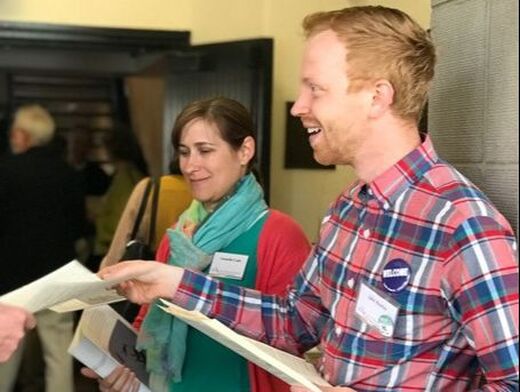|
Mary Pickard, Welcome Team member Being respected and being treated well are not the same as having a feeling of belonging. -- Barb Cederberg  The Welcome Team — otherwise known as greeters or ushers — is reinventing itself at Unity Church. It might not seem obvious. We still hand out orders of service, pass collection plates, and clean up the pews after service. The transformation is happening in our hearts and we hope you will notice in your heart. The shift is rooted in the church’s desire to become more antiracist and multicultural, to create the Beloved Community, moving the emphasis away from the tactical to the relational to fulfill the Welcome Team’s new mission, “Nurturing Mutual Belonging.” “Welcome Team work is a spiritual practice and part of our covenant to provide a continuum of care here at Unity,” says Madeline Summers, team coordinator. “Nurturing mutual belonging starts with us as individuals — our own sense of belonging, knowing who we are, what we’re passionate about, and how we might be perceived by others. Then, it extends to our practice among team members.” Each team now meets 30 minutes before the service to check in, sometimes with a reading or reflection, so members can be grounded and know each other more deeply. By nurturing belonging within each team, we can better nurture belonging beyond to congregants. More focus is being given to interacting with people, so Welcome Team members aren’t going to be found behind tables anymore. Rather, we are circulating in the Parish Hall engaging in conversation. That’s not always easy, says Welcome Team member Barb Cederberg, a self-proclaimed introvert. “We want to do things right. We may not do it right, so it inhibits us from trying. How do we have the courage to try and live with the discomfort? Unity Church members have so much generosity, if mistakes are made, we can overcome.” Barb is passionate about the work. “I can feel where I belong and I can feel where I don’t belong,” says Barb. “Being respected and being treated well are not the same as having a feeling of belonging. I worked in corporate America for many years. I did not acknowledge my spouse, Judy, or that we had children. Nurturing belonging is a feeling of acceptance of self and others. At Unity, I can be myself. How do I encourage others to be themselves?” “Mutual belonging is more complicated than passing the collection plate or picking up Kleenex boxes,” says Jim Oberly, another Welcome Team member. “I’m an old white guy. I’m conscious of that. You know the images of deacons in the old churches — conveying an air of authority as if to say, ‘your money is safe with us.’ I used to wear a coat and tie. I dress differently now — a sweater and slacks.” Continues Jim, “When people enter the church, we greeters are likely to make misinformed judgments based on how someone looks. We need to stay open and curious. I do my best to help visitors figure us out — what might be expected during a service, where things are located, how to get more information — and I try to share something of myself in hopes they will share something of themselves with me.” Nurturing mutual belonging isn’t just for visitors. “It is a good direction for all the groups we have at church,” says Barb. “We should increase our awareness of how the interactions are among us. If someone is standing alone in the Parish Hall, start up a conversation.” She recalls when she was standing in line to greet the ministers and the woman ahead of her looked very sad. “I asked her if she was OK. She had just lost her husband two years earlier – about the time I lost Judy – so we got talking and now we’re good friends.” Jim has seen the value of mutual belonging in other aspects of his church volunteer work. In recent months, he and his wife have been escorting elderly women to church on Sundays. “As so many people came up to greet and fuss over them, I saw the elders come alive! It made them so happy. How many friends and admirers they have!” I guess that’s proof that whether we’re on a Welcome Team or not, all congregants are part of nurturing mutual belonging. If you are interested in joining the Welcome Team, contact Madeline Summers. All church members, including Welcome Team members, are encouraged to take the Intercultural Development Inventory (IDI), a tool to help build our self-knowledge so we can develop our personal and congregational capacity for welcoming all. Further, as we move forward in the spirit of transformation, Welcome Teams will be engaging with the Double Helix Model of Faith Formation and Antiracist Multicultural Work to deepen our practice of welcome.
0 Comments
Leave a Reply. |
Topics
All
Beloved Community ResourcesUnity Justice Database
Team Dynamics House of Intersectionality Anti-Racism Resources in the Unity Libraries Collection Creative Writers of Color in Unity Libraries The History of Race Relations and Unity Church, 1850-2005 Archives
July 2024
Beloved Community Staff TeamThe Beloved Community Staff Team (BCST) strengthens and coordinates Unity’s antiracism and multicultural work, and provides opportunities for congregants and the church to grow into greater intercultural competency. We help the congregation ground itself in the understanding of antiracism and multiculturalism as a core part of faith formation. We support Unity’s efforts to expand our collective capacity to imagine and build the Beloved Community. Here, we share the stories of this journey — the struggles, the questions, and the collaborations — both at Unity and in the wider world.
The current members of the Beloved Community Staff Team include Rev. Kathleen Rolenz, Rev. KP Hong, Rev. Lara Cowtan, Drew Danielson, Laura Park, Lia Rivamonte and Angela Wilcox. |